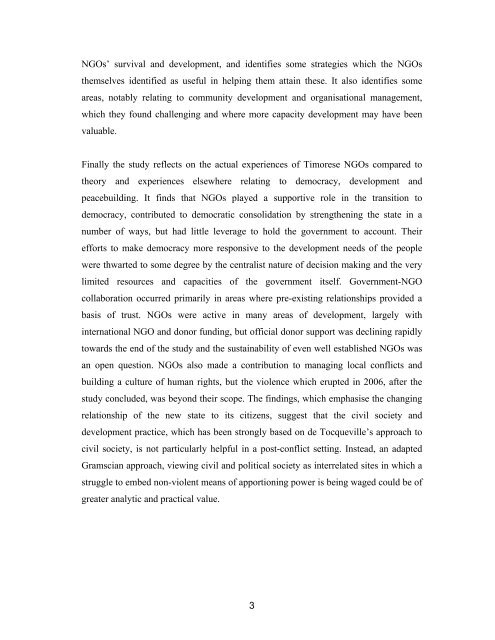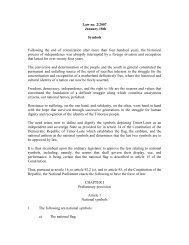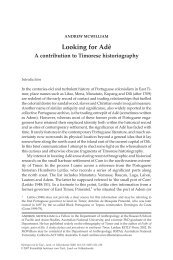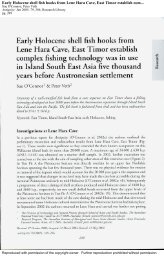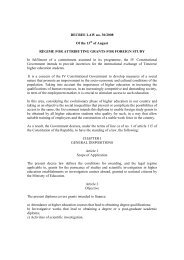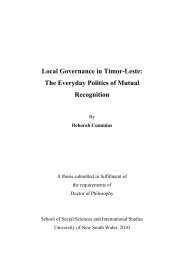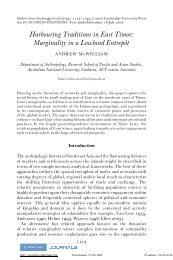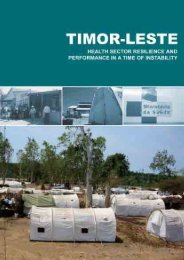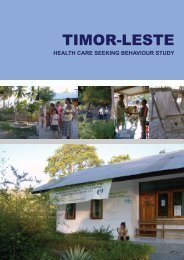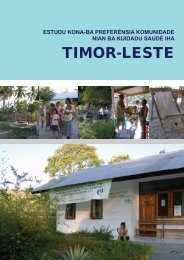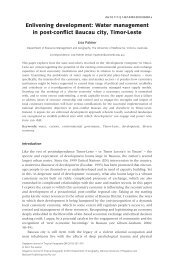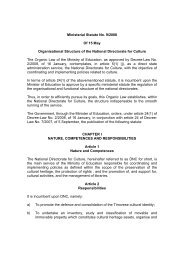- Page 1 and 2: Local NGOs in national development:
- Page 3 and 4: ACKNOWLEDGMENTS My thanks are due p
- Page 5 and 6: TABLE OF CONTENTS Acknowledgements
- Page 7 and 8: 5.1.4 Return to development program
- Page 9 and 10: 8.2.4 The School for Activists (Esc
- Page 11 and 12: GLOSSARY OF ACRONYMS ACFOA Australi
- Page 13 and 14: FRETILIN Revolutionary Front for an
- Page 15 and 16: OMT Organizacao Mulheres Timor (Org
- Page 17 and 18: WORDS IN LANGUAGES OTHER THAN ENGLI
- Page 19: SUMMARY This thesis explores the ro
- Page 24 and 25: Earlier development theory has also
- Page 26 and 27: interested in those organisations w
- Page 28 and 29: provided by the Commonwealth Founda
- Page 30 and 31: Phase 2: Community development: in
- Page 32 and 33: interviews to identify what had hap
- Page 34 and 35: The key questions this thesis addre
- Page 36 and 37: Timorese, and to this end, the defi
- Page 38 and 39: HAK, FOKUPERS, ETADEP, and Caritas
- Page 40 and 41: Table 1 NGOs selected for case stud
- Page 42 and 43: accounts of the roles of the releva
- Page 44 and 45: have not identified individuals in
- Page 46 and 47: many stakeholders, and how they dev
- Page 48 and 49: CHAPTER TWO POST-CONFLICT AND TRANS
- Page 50 and 51: ut added a different third rational
- Page 52 and 53: As Fowler (1997:30-33) recognises,
- Page 54 and 55: (Clark 2003). Najam (1996) lays out
- Page 56 and 57: more than skills training for indiv
- Page 58 and 59: Pearce suggests that CPEs of the 19
- Page 60 and 61: undermined. Further he found that g
- Page 62 and 63: The above studies illustrate the si
- Page 64 and 65: ‘the control of violence is a maj
- Page 66 and 67: As Mercer (2002) points out, civil
- Page 68 and 69: influence on state policies, they s
- Page 70 and 71:
ather top-down approach of NGOs and
- Page 72 and 73:
‘consent’ (meaning learning tol
- Page 74 and 75:
2.6 Civil society and donors A sign
- Page 76 and 77:
donors supported in Latin America t
- Page 78 and 79:
Goodhand and Chamberlain (1996) als
- Page 80 and 81:
Thirdly, the role of the internatio
- Page 82 and 83:
CHAPTER THREE HISTORY OF GOVERNANCE
- Page 84 and 85:
cosmological perspective, Portugues
- Page 86 and 87:
Catholic schools educated 60 per ce
- Page 88 and 89:
3.3 Civil society in the Portuguese
- Page 90 and 91:
decolonisation talks had begun, a b
- Page 92 and 93:
Overall recovery of the economy fro
- Page 94 and 95:
movement as a whole, and this arran
- Page 96 and 97:
others he described as ‘semi-corp
- Page 98 and 99:
(2) High level politics-grassroots
- Page 100 and 101:
sponsored radio, began broadcasting
- Page 102 and 103:
However, a major turning point in t
- Page 104 and 105:
was barely able to function before
- Page 106 and 107:
CHAPTER FOUR THE STORMY TRANSITION
- Page 108 and 109:
Agreement and distributed it clande
- Page 110 and 111:
The only bilateral donor with a phy
- Page 112 and 113:
eflected in donor assessments and p
- Page 114 and 115:
(Brunnstrom 2000: 9). Timorese also
- Page 116 and 117:
‘representative, community based
- Page 118 and 119:
NGOs were reluctant to allow the UN
- Page 120 and 121:
were created, and East Timor was fi
- Page 122 and 123:
The CNRT Congress In August 2000 th
- Page 124 and 125:
The Constitutional Commission and t
- Page 126 and 127:
justice in Indonesia; the need for
- Page 128 and 129:
4.5 NGOs and the new government Onc
- Page 130 and 131:
law still applied. In June 2005 the
- Page 132 and 133:
CHAPTER FIVE THE CASE STUDY NGOS: C
- Page 134 and 135:
Caritas East Timor’s Rural Develo
- Page 136 and 137:
It is probably fair to say that the
- Page 138 and 139:
Additionally Caritas East Timor was
- Page 140 and 141:
clinics were run by various religio
- Page 142 and 143:
knowledge of the local context and
- Page 144 and 145:
training in general analysis. Howev
- Page 146 and 147:
staff also participated in one exch
- Page 148 and 149:
Diocese comprises 26 parishes. Cari
- Page 150 and 151:
ways in which a Catholic organisati
- Page 152 and 153:
fluctuations in its staff size from
- Page 154 and 155:
Government was through its service
- Page 156 and 157:
work soon expanded to areas around
- Page 158 and 159:
closely monitored by a nearby Indon
- Page 160 and 161:
CRS period. 136 As the situation wo
- Page 162 and 163:
only able to grow things on small a
- Page 164 and 165:
provided international training opp
- Page 166 and 167:
way of working with communities and
- Page 168 and 169:
use of tractors, and shifting towar
- Page 170 and 171:
people in key roles who were broade
- Page 172 and 173:
CHAPTER SIX HAK ASSOCIATION (PERKUM
- Page 174 and 175:
6.1 HAK in the late 1990s: its earl
- Page 176 and 177:
international NGOs: HIVOS (Netherla
- Page 178 and 179:
Jakarta. 196 While in Jakarta they
- Page 180 and 181:
6.4 Beyond the emergency: HAK’s n
- Page 182 and 183:
HAK 2001a:8). Throughout this perio
- Page 184 and 185:
Pursue justice for the victims HAK
- Page 186 and 187:
Liquica. HAK’s Branch offices wor
- Page 188 and 189:
The association started with around
- Page 190 and 191:
(Yayasan HAK 2001a, 2002). 228 But
- Page 192 and 193:
There were also a number of HAK’s
- Page 194 and 195:
At the same time HAK was involved i
- Page 196 and 197:
Empowerment, Policy/Advocacy, Inves
- Page 198 and 199:
challenges, the organisation had to
- Page 200 and 201:
Assistance Coordination (NDPEAC) in
- Page 202 and 203:
from over 120 members, and an agree
- Page 204 and 205:
Rights Office and related bodies, a
- Page 206 and 207:
HAK 266 (FOKUPERS 1999). Their init
- Page 208 and 209:
NGOs, Amnesty International, and th
- Page 210 and 211:
Timor Japan Coalition. After UNAMET
- Page 212 and 213:
provide training and education to w
- Page 214 and 215:
1. To ensure that women can live fr
- Page 216 and 217:
women candidates, among them its ow
- Page 218 and 219:
Domestic Violence legislation. The
- Page 220 and 221:
nation’s overarching Penal Code,
- Page 222 and 223:
7.6 Strengthening FOKUPERS’ own c
- Page 224 and 225:
assistance model to strengthen wome
- Page 226 and 227:
uild their organisational and staff
- Page 228 and 229:
CHAPTER EIGHT TIMOR AID AND SAHE Th
- Page 230 and 231:
groups in Australia, North America
- Page 232 and 233:
Timor Aid also played a role in hea
- Page 234 and 235:
problem. 331 This growth also cause
- Page 236 and 237:
The change of Director and implemen
- Page 238 and 239:
In early 2002, with support from Ge
- Page 240 and 241:
Civic education and youth civic edu
- Page 242 and 243:
traditional cloth, woven on a porta
- Page 244 and 245:
(EC). From mid-2001, Timor Aid bega
- Page 246 and 247:
language, enabling a number of trai
- Page 248 and 249:
continued the focus on capacity bui
- Page 250 and 251:
learned the lesson to not accept al
- Page 252 and 253:
HAK went to a workshop organised by
- Page 254 and 255:
groups and university students on t
- Page 256 and 257:
these sectors together. Other organ
- Page 258 and 259:
SAHE continued its original ideas o
- Page 260 and 261:
were not always asking for immediat
- Page 262 and 263:
This capacity to access resources w
- Page 264 and 265:
CHAPTER NINE CHANGING NGO ROLES AND
- Page 266 and 267:
Table 2 Phases in the study period
- Page 268 and 269:
5. Independence—the initial 12-18
- Page 270 and 271:
already had relationships, and foun
- Page 272 and 273:
Ministries, both as individual NGOs
- Page 274 and 275:
9.2 Overview of LNGO roles It is no
- Page 276 and 277:
It is also evident that since many
- Page 278 and 279:
weakened NGOs, at least temporarily
- Page 280 and 281:
workshops on development issues (su
- Page 282 and 283:
time and develop new strategies. Ex
- Page 284 and 285:
international NGO partners. Helping
- Page 286 and 287:
assess and reassess the context in
- Page 288 and 289:
FOKUPERS, were formed to protect po
- Page 290 and 291:
Their experience suggested that two
- Page 292 and 293:
disputes. Similarly KSI, a research
- Page 294 and 295:
that the national leadership tended
- Page 296 and 297:
some scepticism about, and distrust
- Page 298 and 299:
10.2 Local NGOs in development Deve
- Page 300 and 301:
development, providing early and co
- Page 302 and 303:
10.3 NGO roles in post-conflict pea
- Page 304 and 305:
also became active (de Araujo 2004)
- Page 306 and 307:
and UN Volunteers. 2006). UNDP was
- Page 308 and 309:
promotion than others. For other of
- Page 310 and 311:
of clean water and sanitation, lack
- Page 312 and 313:
hard to come by, and government res
- Page 314 and 315:
Appendix A Preliminary Lists of NGO
- Page 316 and 317:
PAS PAS Dili, Baucau, Lautem Satilo
- Page 318 and 319:
Lorosae Rumah Raykat I (Baucau) YCD
- Page 320 and 321:
sector, official donors were only p
- Page 322 and 323:
Grupo Feto Foinsa’e Timor-Lorosa
- Page 324 and 325:
Yayasan Halarae (means ‘Land Care
- Page 326 and 327:
Roman Luan Roman Luan is a local NG
- Page 328 and 329:
had been very evident after the Asi
- Page 330 and 331:
new director again in mid-2005 it s
- Page 332 and 333:
13. How did the organisation get re
- Page 334 and 335:
Since May 2002 35. What changes in
- Page 336 and 337:
Christian Children’s Fund Lola do
- Page 338 and 339:
Joachim da Costa 15 June and 1 Octo
- Page 340 and 341:
CIDA Afonso Aleixo 5 July 2004 Afon
- Page 342 and 343:
Peter Zwart Caritas NZ Clare Danby
- Page 344 and 345:
• HAK Foundation: HIVOS Counterpa
- Page 346 and 347:
Appendix F Some Examples of Officia
- Page 348 and 349:
AusAID In March 2001 AusAID began t
- Page 350 and 351:
A mid-term review of that Program i
- Page 352 and 353:
CIDA, CANADA Canada Fund for Local
- Page 354 and 355:
REFERENCES Abdela, L., 2003, ‘Kos
- Page 356 and 357:
Banerjee, N., 2003, ‘The capacity
- Page 358 and 359:
Bryant, R. L., 2002, ‘Non-governm
- Page 360 and 361:
Chambers, R., 1992, ‘Spreading an
- Page 362 and 363:
Constantino-David, K., 1997, ‘Int
- Page 364 and 365:
Democratic Republic of Timor-Leste
- Page 366 and 367:
East Timor NGO Forum, 2000d, INF: N
- Page 368 and 369:
Escobar, A., 2000, ‘Beyond the se
- Page 370 and 371:
—— 1999, ‘Partnerships—nego
- Page 372 and 373:
Hakena, H., Ninnes, P., and Jenkins
- Page 374 and 375:
Holloway, R., 2004a, ‘What is civ
- Page 376 and 377:
Jeffrey, A., 2007, ‘The geopoliti
- Page 378 and 379:
Kingsbury, D., 2007, ‘Political d
- Page 380 and 381:
Lillehammer, G. C., 2003, State-NGO
- Page 382 and 383:
Marcussen, H. S., 1996, ‘NGOs, th
- Page 384 and 385:
Minear, L., 2002, The humanitarian
- Page 386 and 387:
Nyamugasira, W., 1998, ‘NGOs and
- Page 388 and 389:
Pfeiffer, J. 2003, ‘International
- Page 390 and 391:
Rowley, K., 2005, ‘Cambodia after
- Page 392 and 393:
Silliman, G. S., and Noble, L. G.,
- Page 394 and 395:
Sustainable Development and the Env
- Page 396 and 397:
United Nations, 2000b, Security Cou
- Page 398 and 399:
USC, 2007, ‘USC Canada: Timor-Les
- Page 400 and 401:
White, S. C., 1999, ‘NGOs, civil


